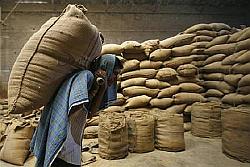 | « Back to article | Print this article |
The revised National Food Security Bill (NFSB) gives greater flexibility to states. For one, NFSB, cleared by the Cabinet last week and due to be presented in Parliament, allows states to choose the timing of launching the scheme. For another, the revised Bill allows states such as Chhattisgarh to continue with existing food security programmes.
For another, the revised Bill allows states such as Chhattisgarh to continue with existing food security programmes.
Some states, such as West Bengal, had expressed reservations over a single-date rollout on the ground that they would not be ready to implement it in a fool-proof manner.
The revised Bill could not be tabled in Parliament before the recess of the Budget session due to adjournments.
Parliament concluded its pre-recess segment on Friday and went into a recess for a month. However, the government hopes to pass it in Parliament in the Budget session itself.
The revised Bill also does not bar any state or the Centre from continuing or launching other food-based